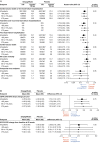Effects of empagliflozin on cardiovascular and renal outcomes in heart failure with reduced ejection fraction according to age: a secondary analysis of EMPEROR-Reduced
- PMID: 36194680
- PMCID: PMC10092219
- DOI: 10.1002/ejhf.2707
Effects of empagliflozin on cardiovascular and renal outcomes in heart failure with reduced ejection fraction according to age: a secondary analysis of EMPEROR-Reduced
Abstract
Aims: Empagliflozin improves cardiovascular and renal outcomes in patients with heart failure (HF) and reduced ejection fraction (HFrEF), but its efficacy and safety across patient's age is not well established.
Methods and results: We assessed the effects of empagliflozin (10 mg daily) versus placebo, on top of standard HF therapy, in symptomatic HFrEF patients with a left ventricular ejection fraction ≤40% and increased natriuretic peptides stratified by age (<65, 65-74, ≥75 years). The primary endpoint was a composite of cardiovascular death or HF hospitalization. Key secondary endpoints included first and recurrent HF hospitalizations and slope of change in estimated glomerular filtration rate (eGFR); the latter was supported by an analysis of a renal composite endpoint (chronic dialysis or renal transplantation or profound and sustained reduction in eGFR). Of 3730 patients, 38% were <65 years, 35% were 65-74 years and 27% were ≥75 years. Compared with placebo, empagliflozin reduced the primary endpoint consistently across the three age groups (hazard ratio 0.71 [95% confidence interval 0.57-0.89] for <65 years, 0.72 [0.57-0.93] for 65-74 years, 0.86 [0.67-1.10] for ≥75 years, interaction p-trend test = 0.24). The effects of empagliflozin were also consistent across age groups for key secondary endpoints of first and recurrent HF hospitalization (p-trend = 0.30), the rate of decline in eGFR (p-trend = 0.78) and the renal composite (p-trend = 0.94). Adverse events (AEs), serious AEs and AEs leading to drug discontinuation increased with age in both treatment arms, but empagliflozin did not increase their incidence over placebo within each age group.
Conclusion: The efficacy and safety of empagliflozin in improving cardiovascular and renal outcomes in HFrEF was consistent across the spectrum of age, including older patients (aged ≥75).
Keywords: Age; Empagliflozin; Heart failure; Sodium-glucose cotransporter 2 inhibitors.
© 2022 The Authors. European Journal of Heart Failure published by John Wiley & Sons Ltd on behalf of European Society of Cardiology.
Figures

Comment in
-
Sodium-glucose cotransporter 2 inhibitors: efficacious and safe in elderly patients with heart failure.Eur J Heart Fail. 2022 Dec;24(12):2305-2306. doi: 10.1002/ejhf.2744. Epub 2022 Nov 23. Eur J Heart Fail. 2022. PMID: 36394526 No abstract available.
References
-
- Zarrinkoub R, Wettermark B, Wändell P, Mejhert M, Szulkin R, Ljunggren G, et al. The epidemiology of heart failure, based on data for 2.1 million inhabitants in Sweden. Eur J Heart Fail. 2013;15:995–1002. - PubMed
-
- Heidenreich PA, Albert NM, Allen LA, Bluemke DA, Butler J, Fonarow GC, et al.; American Heart Association Advocacy Coordinating Committee, Council on Arteriosclerosis, Thrombosis and Vascular Biology, Council on Cardiovascular Radiology and Intervention, Council on Clinical Cardiology, Council on Epidemiology and Prevention, Stroke Council . Forecasting the impact of heart failure in the United States: a policy statement from the American Heart Association. Circ Heart Fail. 2013;6:606–19. - PMC - PubMed
-
- Filippatos G, Parissis JT. Heart failure diagnosis and prognosis in the elderly: the proof of the pudding is in the eating. Eur J Heart Fail. 2011;13:467–71. - PubMed
Publication types
MeSH terms
Substances
LinkOut - more resources
Full Text Sources
Medical
Research Materials
Miscellaneous

